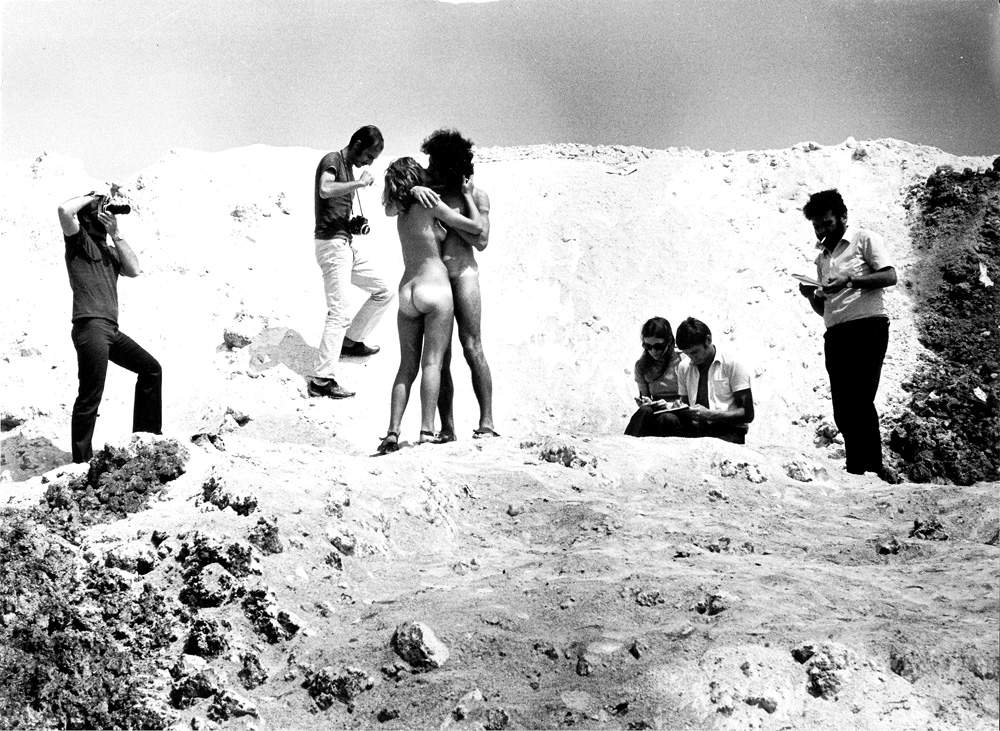The exhibition Sirio Luginbühl: experimental films, at the Praetorian Palace in Cittadella, is on view from April 15 to July 15, 2018: the exhibition, which comes at the conclusion of the project to digitize and preserve the private film collection of director Sirio Luginbühl (Verona, 1937 - Padua, 2014), is curated by Guido Bartorelli and Lisa Parolo and presents to the public the masterpieces on film of the Venetian film-maker, always attentive to the international avant-garde, an experimenter who fused avant-garde, irony and eroticism by scrupulously and even mischievously observing reality (from politics to the sexual revolution, from class struggle to feminism), creating films that were characterized by their provocative nature and modernity.
Luginbühl began working in the 1960s, in the revolutionary context that changed world history. In Padua, in particular, the city where the artist worked, the so-called Gruppo N was formed, which included artists such as Alberto Biasi, Ennio Chiggio, Toni Costa, Edoardo Landi and Manfredo Missironi: personalities capable of fusing concrete poetry, literary neo-avant-garde, scientific approach and experimentalism that attracted the attention of Luginbühl who, between 1964 and 1965, began to produce his first theatrical and experimental shows, with happenings that disrupted the Padua of the time. “In line with the revolutionary trends of the time,” we read in the presentation, “with his films Luginbühl wants to disconcert, shock, amaze and overcome the limit of so-called good taste through the use of sexuality, the pervasiveness of advertisements, blood as a symbol of death and social struggle, that is, some of the recurring themes in his vast production. Luginbühl’s experimentation is found in the creative process, i.e., in the idea, the choice of settings, the involvement of actors, the immediacy of filming and, most of all, in the final treatment and editing of the developed film, in which Luginbühl expresses the narrative and linguistic fractures learned from the poets and artists of the neo-avant-garde; in fact, it is the post-production interventions on the film, in addition to the conceptual and historical significance of his works, that make his films experimental, abstract and realist at the same time.”
“Ours,” Luginbühl himself emphasized, “is a cinema that differentiates itself, a cinema that wants to be a return to nature, that wants to arouse a valid theme in the spectator’s soul, that wants to start anew.” The exhibition also stems from the consideration that experimental cinema has rarely enjoyed adequate visibility and is little known to the public, since the cinematic sphere is dominated by commercial programming and experimental screenings are confined to dedicated film clubs or festivals. In each of the rooms of the Praetorian Palace, therefore, films will be shown on a loop, with the visitor free to manage the viewing on his or her own, so that he or she can enter and leave the rooms freely without compromising, however, the full enjoyment of the exhibition, since Luginbühl’s films do not have a narrative progression. Short but intense films that allow the visitor to “penetrate,” the presentation goes on to say, “into an otherwise elusive complexity.” There will also be spaces dedicated to film technology, where the public can admire an old projector and touch the various film formats. And again, accompanying the exhibition will be a series of screenings of experimental artists’ films (with loans coming in from MoMA in New York, the Groninger Museum in Groninga, and the Light Cone in Paris) featuring masterpieces by Andy Warhol, Stan Brakhage, Gerry Schum, the Fluxus group, Paolo Gioli, and Michele Sambin.
The exhibition opens Tuesday from 3 to 7 p.m., Wednesday through Saturday from 9 a.m. to 12:30 p.m. and 3 to 7 p.m., and Sunday from 10 a.m. to 7 p.m. The exhibition is sponsored by the non-profit Palazzo Pretorio Foundation, in collaboration with the Department of Cultural Heritage of the University of Padua and the Department of Humanities and Cultural Heritage of the University of Udine, with contributions from the City of Cittadella and the Fondazione Cassa di Risparmio di Padova e Rovigo. Catalog published by CLEUP.
Image: Sirio Luginbühl, Amarsi a Marghera, Il Bacio (1970; 8 mm film; courtesy Archivio Privato Antonio Concolato, Padua)
 |
| The avant-garde and eroticism of Sirio Luginbühl's films at the Praetorian Palace in Cittadella |
Warning: the translation into English of the original Italian article was created using automatic tools. We undertake to review all articles, but we do not guarantee the total absence of inaccuracies in the translation due to the program. You can find the original by clicking on the ITA button. If you find any mistake,please contact us.